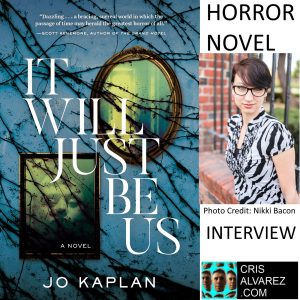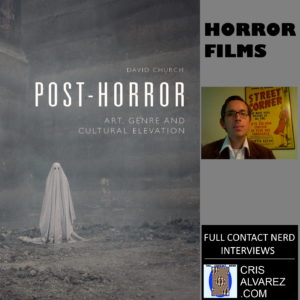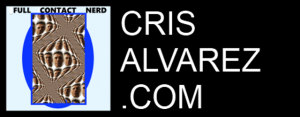
Jo Kaplan discusses her Gothic horror novel
The Interview
Horror – An interview with Jo Kaplan about her new book It Will Just Be Us published by Crooked Lane Books. It’s a new chilling gothic horror novel about vampires. Check out the book here https://amzn.to/3nxNDuU
Of all the creative ideas you have, how did this one idea rise above the rest and get written?
I’ve always loved haunted house stories. There’s something classic, timeless, and unsettling about the idea of one’s home becoming invaded by the supernatural. I think it’s my passion for the genre, and my desire to do something (hopefully) new with it, that made this idea manifest itself for me. I also wanted to write a book about sisters who have an extremely tense and conflicted relationship, and everything just sort of clicked with this one.
What is the book about – protagonist, setting, and conflict?
It Will Just Be Us follows Sam Wakefield, who is living with her mother in her childhood home: Wakefield Manor, a decaying mansion on the edge of the Great Dismal Swamp. The house is haunted, in a sense—haunted with echoes of the past, replaying its history over and over again. She has grown up in this strange environment, and is, in turn, a bit strange herself.
Her pregnant sister, Elizabeth, returns home after a falling out with her husband, and soon after, Sam begins to see a mysterious, menacing boy with no face who has violent tendencies. And he seems different than the house’s other ghosts: he is far more than just an echo…
What sort of aesthetic does the book have?
This book has a very moody, Gothic aesthetic. It is contemplative and (I hope) unsettling, with an atmosphere of dread.
So it seems you may be interested more in haunted settings that people involuntarily get trapped in rather than haunted places that people actively look for and enter. Is that an accurate assessment? How would you differentiate between the two approaches?
That’s something I hadn’t really thought of before, but I suppose you’re right. Of course, now I’m interested in writing a story about people who actively seek out a haunted house! I think both approaches are interesting and have an equal chance at being frightening. If you’re involuntarily trapped in a haunted place, there’s a lack of control over the situation that is frightening. But then, if you actively sought out a haunted place, there’s potential for the realization that you brought the horror on yourself…
If the book had a soundtrack, what might it be like?
I think it would be something with lots of eerie strings. Some haunting cello. Very moody!
Did you have to do any research for the book?
Yes, I spent quite a bit of time researching the Great Dismal Swamp, where it takes place. I was particularly interested in learning about the maroons who lived there: escaped slaves who created communities inside of the swamp, which was so treacherous that they were unlikely to be recaptured. One thing that interested me was how I had never learned anything at all about this, unlike, say, the Underground Railroad. It’s not a white savior narrative, but about slaves who freed themselves and took ownership of their lives. I wanted to explore this, so it appears in my book when we get to see glimpses of the past.
What’s your approach to witches and necromancer types in your work or your interest in the haunted?
I think witches are interesting figures to work with partially because of the way they have been reclaimed by feminists. Historically, women were labeled witches as a way to oppress them, but the movie The VVitch is an excellent example that subverts this, in the way it depicts a character actively choosing to claim power as a reaction against this very oppression. It’s an interesting dynamic, and I think I gravitate towards that.
Your work appears to be focused on ghosts. Is that true and if so what are your feelings about monsters or gore in horror?
I think there’s room for all of this in horror! I am more drawn to the psychological and the atmosphere of creeping dread, which seems like a more natural fit with ghost stories, but I think monsters and gore definitely have their place—and I’ve written those kinds of stories, too!
Do you explore insanity in your horror or is it more about “normal” fear and dread?
I think insanity is a fascinating subject, one that stems from the Gothic tradition. But I don’t think that is at odds with more “normal” fear and dread—what’s most interesting to me is the dynamic between the two, when fear and dread become so profound that we must question our own sanity.
What are some of the genre works that inspire you – books, movies, tv, music, etc.
Probably too many to name! I’m constantly in awe of, and inspired by, new books coming out in the horror genre that totally blow me away. The most obvious inspiration for It Will Just Be Us, though, is Shirley Jackson’s We Have Always Lived in the Castle. But I’ve also recently read work by Stephen Graham Jones, Ramsey Campbell, and Silvia Moreno-Garcia that I’ve just loved and feel inspired by.
In terms of movies, my inspirations are thoughtful, atmospheric works of horror—like The Witch, Hereditary, The Lighthouse, Midsommar… okay, I guess I just really like Ari Aster and Robert Eggers.
As far as music, I adore creepy classical music. Saint-Saens’ Danse Macabre? Played it at my Halloween wedding, along with Funeral March for a Marionette by Gounod. Give me some of Mussorgsky’s Night on Bald Mountain, Verdi’s Dies Irae… yeah, that’s my jam.
What is your writing and editing process like? Anything different from other authors?
I think my process is probably pretty typical. One thing I can’t seem to stop myself from doing, though, is revising as I write the first draft. I’ll write, go back and revise, write more, backtrack to revise, etc. It’s almost always two steps forward and one step back. I think that’s why it takes me a while to complete a first draft… because by the time I’ve got a first draft done, the first half of the book is probably in its fifth or sixth draft! Then I always go back and revise the whole thing again, probably several times. I truly believe the revision is where the magic happens, and I love that part of the process.
How has your approach to writing changed over time?
I don’t think it’s changed much aside from the hope that I know what I’m doing more now than when I first started writing!
Have you done any non-writing work that has influenced how you write or what you write about?
My primary employment is as an English instructor at a local college, and that informed It Will Just Be Us because Sam Wakefield is an adjunct instructor. Though there’s not a lot of similarity between our experiences in teaching, it has given me insight into being on the other side of the podium, which definitely makes it easier to write academic characters.
When you were younger was there a power, technology, or fictional setting you yearned for or to be a part of?
Like most millennials, I wanted to go to Hogwarts and be part of the Harry Potter universe.
Did you have any difficulties finishing this book?
Not in particular. I’m a pretty motivated person so I can’t stand leaving a project unfinished, even if it takes me a while. When I commit to a novel, I have to really commit to it.
What’s your current or next writing project?
I just finished writing a sort of Western-themed horror novel that is now in the hands of my agent. I’m really excited about this one!
Where can people find you online?
You can find me at my website: http://jo-kaplan.com, or on Twitter and Instagram @joannapary
Biographical information
Name: Jo Kaplan
Bio: Jo Kaplan writes and teaches in the Los Angeles area with much encouragement from her husband and two cats. Her fiction (sometimes as Joanna Parypinski) has appeared in Fireside Quarterly, Black Static, Nightmare Magazine, Vastarien, Haunted Nights edited by Ellen Datlow and Lisa Morton, Don’t Turn Out the Lights: A Tribute to Alvin Schwartz’s Scary Stories to Tell in the Dark edited by Jonathan Maberry, and the Nightscript series. Her novel, It Will Just Be Us, comes out September 8, 2020. She teaches English and creative writing at Glendale Community College.
Project/work being discussed: It Will Just Be Us
Links of interest
Check out the book here https://amzn.to/3nxNDuU
https://www.penguinrandomhouse.com/books/647537/it-will-just-be-us-by-jo-kaplan/
http://jo-kaplan.com
https://www.instagram.com/joannapary/
https://twitter.com/joannapary
As an Amazon Associate I earn from qualifying purchases.





